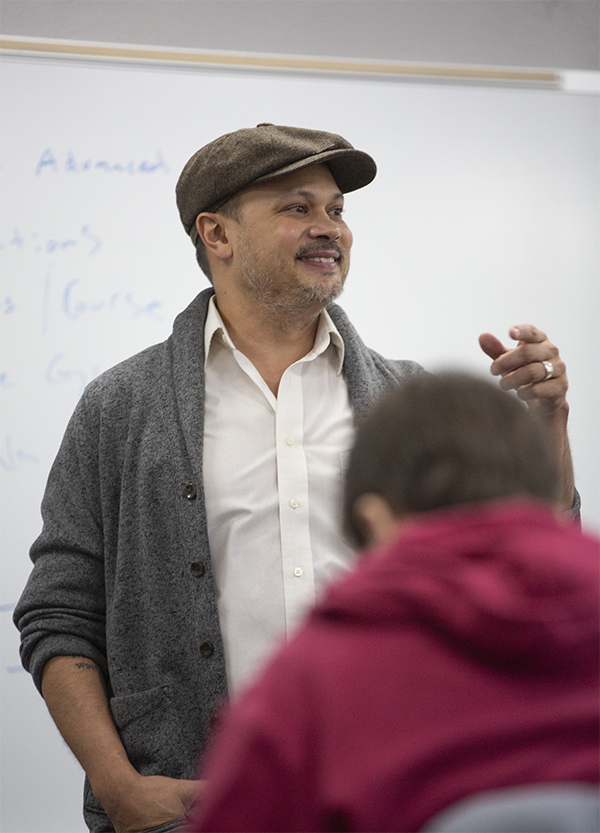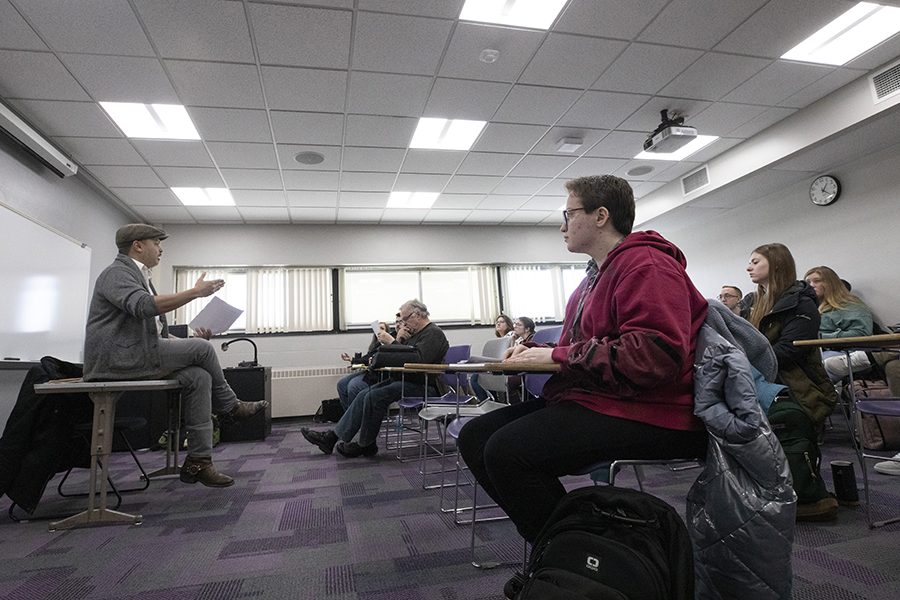UW-Whitewater’s Nicholas Gulig wants to share his love of literature after being named new State Poet Laureate of Wisconsin
February 03, 2023
Written by Dave Fidlin | Photos by Craig Schreiner

As a child, Nicholas Gulig gained a deep love of poetry through a variety of pivotal experiences. In the years since, he has aspired to share his passion and wants to further the mission as he settles into a new honorary role.
Gulig, an associate professor of languages and literatures at the University of Wisconsin-Whitewater, was recently named to the new two-year term of State Poet Laureate of Wisconsin by a panel overseeing it.
The Wisconsin Poet Laureate Commission cited several reasons for Gulig’s appointment to the leadership position, including his demonstrated commitment to promoting and advancing the importance of literature — most notably, through poetry.
“One of the things that I want to do is be as available as humanly possible to the needs of the people, the communities and the organizations that are supporting poetry in Wisconsin,” said Gulig, who joined the UW-Whitewater faculty in 2016. “Whatever they need — if I am able to help them continue to do what they’re doing — I’ll work to help increase their visibility.”
As the State Poet Laureate, Gulig will serve as an ambassador of sorts for the literary craft, while simultaneously undertaking a project that will be completed by the end of 2024. He will give talks at various seminars, workshops and similar venues throughout Wisconsin.
The position, Gulig said, offers a degree of flexibility to suit each laureate’s professional background and personal approach to the role. As he looks to the next two years, Gulig said he aspires to fill some of the gaps he experienced as a child and create a collective sense of community.
“I grew up feeling like there was no support for people who were interested in, and were doing the things that I did as a kid and young adult here in Wisconsin,” Gulig said. “I was wrong about that because there are all of these pockets of people that are taking time out of their day and out of their schedules to provide these platforms and spaces for poets to flourish and be recognized.”
He is still fleshing out the granular details, but Gulig said his goal for the culminating laureate project is to assemble a document or book, outlining how Wisconsin has supported the arts —and, more specifically, poetry.
Gulig credits his parents for instilling within him an appreciation for the arts. As a young child, his dad made it a point to read him poetry-filled bedtime stories. As he grew older, Gulig looked to books as a leisure activity.
“I grew up with books as a form of entertainment,” Gulig said. “The thing I looked forward to wasn’t playing video games or turning on the television — it was going to the library and getting books. My house was filled with books. My love of poetry came from a love for reading.”
Music also played a pivotal role in shaping his love of the written word through a poetic form.
“You’re not only thinking about what words are saying, you’re thinking about how words are in relationship to one another,” Gulig said of the art form. “I grew up listening to my father’s record collection. I was listening to albums back then in the way that kids watch YouTube videos today. My ear was trained to be attentive from an early age.”

Gulig’s foray into academia came from a love of teaching and was a platform for bringing together two of his passions.
“I think the real joy of being a teacher is spending the vast majority of my waking life thinking about poems, with students who care about poems,” said Gulig, whose roles on campus also include running “The Muse,” the campus literary journal, and overseeing the UW-Whitewater Creative Writing Festival.
Since the vast majority of his students are in the earliest stages of their adult years, Gulig said he can discuss the intrinsic beauty and value of poetry at a very specific, foundational point in their lives.
“Oftentimes, they’re coming from spaces where they haven’t had a lot of exposure to the wilderness of the poetic landscape,” he said. “What they have is curiosity and talent that is raw, unsculpted and hasn’t been exercised a lot.”
Gulig said he considers it a privilege to give his students the opportunity to view literature in a way they might not have considered it in the past.
“I get to be the one who gets to put a poem in their hands and say, ‘Spend the weekend reading this. We’re going to talk about this poem on Monday,’” he said. “They’ve never had anything like that. This is the first time they get to experience poetry with that level and duration of attention.”
In some respects, Gulig acknowledges his role as a teacher is a full-circle moment and gives him the opportunity to reflect on what brought him to poetry and teaching.
“I get to relive that moment of my life, but from a different lens,” he said. “My students are so filled with wonder and curiosity. As we get older, it’s hard to be curious. We start to feel like we’ve seen it all. The world is worth being curious about.”
